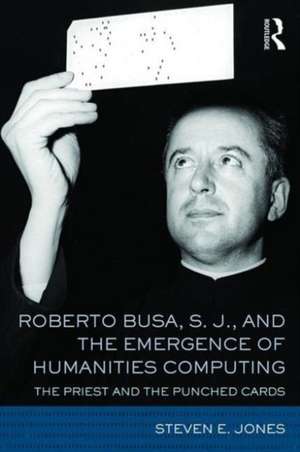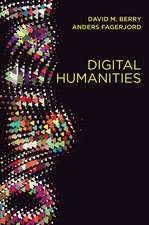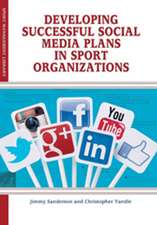Roberto Busa, S. J., and the Emergence of Humanities Computing: The Priest and the Punched Cards
Autor Steven E. Jonesen Limba Engleză Hardback – 8 apr 2016
Preț: 1107.61 lei
Preț vechi: 1350.75 lei
-18% Nou
Puncte Express: 1661
Preț estimativ în valută:
211.94€ • 221.88$ • 175.37£
211.94€ • 221.88$ • 175.37£
Carte tipărită la comandă
Livrare economică 05-19 aprilie
Preluare comenzi: 021 569.72.76
Specificații
ISBN-13: 9781138186774
ISBN-10: 1138186775
Pagini: 194
Ilustrații: 11
Dimensiuni: 152 x 229 x 15 mm
Greutate: 0.41 kg
Ediția:1
Editura: Taylor & Francis
Colecția Routledge
Locul publicării:Oxford, United Kingdom
ISBN-10: 1138186775
Pagini: 194
Ilustrații: 11
Dimensiuni: 152 x 229 x 15 mm
Greutate: 0.41 kg
Ediția:1
Editura: Taylor & Francis
Colecția Routledge
Locul publicării:Oxford, United Kingdom
Public țintă
Postgraduate and UndergraduateCuprins
Introduction. Roberto Busa, S.J., and the Emergence of Humanities Computing. Chapter 1. Priest Walks Into the C.E.O.’s Office. Chapter 2. Oracle on 57th Street. Chapter 3. The Mother of All Humanities Computing Demos. Chapter 4. Centers of Activity. Chapter 5. Computing Philology.
Recenzii
"An essential investigation, covering both technological advancement, and the lived experience of Father Busa as he undertook his groundbreaking, and field forming, research. This text is vital reading for those interested in the history of computing, and the use of computing in history." –Melissa M. Terras, University College London
"Steve Jones explodes the most oft-repeated origin story of the Digital Humanities and then puts it back together again piece by archival piece, replacing mythology and commonplace with scrupulous research, forensic reconstruction, and deep media archaeology. It is a work of scholarship that is as lively and atmospheric (and compelling) as a novel." -Matthew Kirschenbaum, University of Maryland, College Park
"This fascinating book succeeds in both problematizing and pushing forward our hitherto limited understandings of the complex and shifting relationships that developed between Busa and IBM, on one side, and the emerging field of Digital Humanities, on the other. It is a tremendous and important contribution to scholarship on the History of (Digital) Humanities." –Julianne Nyhan, University College London
"This book is a must-read — and a pleasure, at that — for scholars and students of cultural theory, humanities computing and digital humanities, intellectual history, and Jesuit contributions to contemporary culture." -Micki McGee, Fordham University
"This book is well-written and accessible to a general audience. There is little technical jargon. As a computer historian, I might have wished for more technical detail, but technology is not the main thrust of this book. I thoroughly enjoyed reading this book, and I can recommend it to a wide audience." -Paul Ceruzzi, Smithsonian Institution National Air and Space Museum
"An essential investigation, covering both technological advancement, and the lived experience of Father Busa as he undertook his groundbreaking, and field forming, research. This text is vital reading for those interested in the history of computing, and the use of computing in history." –Melissa M. Terras, University College London
"Steve Jones explodes the most oft-repeated origin story of the Digital Humanities and then puts it back together again piece by archival piece, replacing mythology and commonplace with scrupulous research, forensic reconstruction, and deep media archaeology. It is a work of scholarship that is as lively and atmospheric (and compelling) as a novel." -Matthew Kirschenbaum, University of Maryland, College Park
"This fascinating book succeeds in both problematizing and pushing forward our hitherto limited understandings of the complex and shifting relationships that developed between Busa and IBM, on one side, and the emerging field of Digital Humanities, on the other. It is a tremendous and important contribution to scholarship on the History of (Digital) Humanities." –Julianne Nyhan, University College London
"This book is a must-read — and a pleasure, at that — for scholars and students of cultural theory, humanities computing and digital humanities, intellectual history, and Jesuit contributions to contemporary culture." -Micki McGee, Fordham University
"This book is well-written and accessible to a general audience. There is little technical jargon. As a computer historian, I might have wished for more technical detail, but technology is not the main thrust of this book. I thoroughly enjoyed reading this book, and I can recommend it to a wide audience." -Paul Ceruzzi, Smithsonian Institution National Air and Space Museum
"Steven E. Jones's book is an entertaining and profound contribution to current discussions in the humanities." -Daniela Zetti, H-Net Reviews
"Steven Jones has filled out a wonderful 1950s story....It is a story worth knowing and remembering: it tells us about a somewhat forgotten past and offers lessons for a future that in some respects has already arrived."--Stephen Schloesser SJ, Cristianesimo Nella Storia
"Steve Jones explodes the most oft-repeated origin story of the Digital Humanities and then puts it back together again piece by archival piece, replacing mythology and commonplace with scrupulous research, forensic reconstruction, and deep media archaeology. It is a work of scholarship that is as lively and atmospheric (and compelling) as a novel." -Matthew Kirschenbaum, University of Maryland, College Park
"This fascinating book succeeds in both problematizing and pushing forward our hitherto limited understandings of the complex and shifting relationships that developed between Busa and IBM, on one side, and the emerging field of Digital Humanities, on the other. It is a tremendous and important contribution to scholarship on the History of (Digital) Humanities." –Julianne Nyhan, University College London
"This book is a must-read — and a pleasure, at that — for scholars and students of cultural theory, humanities computing and digital humanities, intellectual history, and Jesuit contributions to contemporary culture." -Micki McGee, Fordham University
"This book is well-written and accessible to a general audience. There is little technical jargon. As a computer historian, I might have wished for more technical detail, but technology is not the main thrust of this book. I thoroughly enjoyed reading this book, and I can recommend it to a wide audience." -Paul Ceruzzi, Smithsonian Institution National Air and Space Museum
"An essential investigation, covering both technological advancement, and the lived experience of Father Busa as he undertook his groundbreaking, and field forming, research. This text is vital reading for those interested in the history of computing, and the use of computing in history." –Melissa M. Terras, University College London
"Steve Jones explodes the most oft-repeated origin story of the Digital Humanities and then puts it back together again piece by archival piece, replacing mythology and commonplace with scrupulous research, forensic reconstruction, and deep media archaeology. It is a work of scholarship that is as lively and atmospheric (and compelling) as a novel." -Matthew Kirschenbaum, University of Maryland, College Park
"This fascinating book succeeds in both problematizing and pushing forward our hitherto limited understandings of the complex and shifting relationships that developed between Busa and IBM, on one side, and the emerging field of Digital Humanities, on the other. It is a tremendous and important contribution to scholarship on the History of (Digital) Humanities." –Julianne Nyhan, University College London
"This book is a must-read — and a pleasure, at that — for scholars and students of cultural theory, humanities computing and digital humanities, intellectual history, and Jesuit contributions to contemporary culture." -Micki McGee, Fordham University
"This book is well-written and accessible to a general audience. There is little technical jargon. As a computer historian, I might have wished for more technical detail, but technology is not the main thrust of this book. I thoroughly enjoyed reading this book, and I can recommend it to a wide audience." -Paul Ceruzzi, Smithsonian Institution National Air and Space Museum
"Steven E. Jones's book is an entertaining and profound contribution to current discussions in the humanities." -Daniela Zetti, H-Net Reviews
"Steven Jones has filled out a wonderful 1950s story....It is a story worth knowing and remembering: it tells us about a somewhat forgotten past and offers lessons for a future that in some respects has already arrived."--Stephen Schloesser SJ, Cristianesimo Nella Storia
Descriere
It’s the founding myth of humanities computing and digital humanities: In 1949, the Italian Jesuit scholar, Roberto Busa, S.J., persuaded IBM to offer technical and financial support for the mechanized creation of a massive lemmatized concordance to the works of St. Thomas Aquinas. Using Busa’s own papers, recently accessioned in Milan, as well as IBM archives and other sources, Jones illuminates this DH origin story. He examines relationships between the layers of hardware, software, human agents, culture and history and answers the question of how specific technologies afford and even constrain cultural practices, including in this case the academic research agendas of humanities computing and, later, digital humanities.











